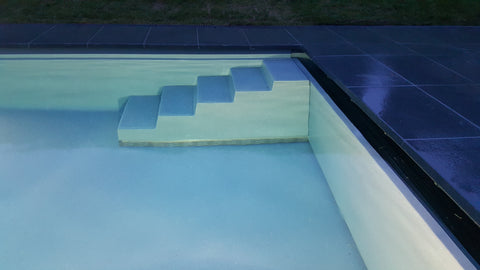3 easy ways to achieving safe and crystal clear pools - European Style
Today, we'll discuss how Europe filters the pool water different from the Americans and how some advocates day that Deutsches Institute fur Normung or DIN standard is 40 years ahead of the U.S.
"They use much less chlorine, and the approach to filtration is completely different. They have drain-and-fill requirements and mandatory cleansing showers for bathers. It's not just one thing, but a spectrum of ideas and methods that all work together." says Roy Vore, technology manager for Bio-Lab.
Perhaps the most noticeable difference is the recommended chlorine level of 0.2-to-0.6 ppm — dramatically less than the levels recommended for public pools in North America (1-to-4 ppm).
Without further ado, these are the 3 easy ways:
- Proper mechanical filtration
- Lesser use of chlorine
- Freshwater Replacement
Let's go into details.
1. Proper Mechanical Filtration
"A properly sized sand filter with flocculation will work much better than a DE or cartridge ever can. You're going to operate at 10 gpm per square foot, or less. I think all filters should work at that slower rate. It gives you contact time within the freeboard to allow the flocculation to work and agglomerate the particles, which keeps them at the top of the sand bed, and it's easier to backwash. It doesn't drive the dirt into the sand bed. You also have to pay attention to your backwash speeds, so they are fast enough to create enough expansion to release the dirt." says Ashworth of Aqua Magazine.
What is needed for proper mechanical filtration? a properly sized filter, the right filtration media, variable speed pump and flocculation.

2. Lesser use of chlorine
The big advantages of reduced chlorine levels are well known, starting with a reduction of disinfection byproducts or DBPs. DBPs cause a range of water-quality related issues including the familiar "chlorine smell," which is largely caused by trichloramines, cloudy water and other problems such as skin, eye and lung irritation.
How to achieve lesser chlorine usage? it all goes back to proper mechanical filtration. Lesser organics in water means lesser need of chlorine for oxidation. The better the filtration quality, the lesser the chlorine required. Chlorine must be left for sanitation alone.
3. Freshwater Replacement
Another key measure defined in the DIN Standard requires that pools be partially drained and refilled on a regular basis, based on a calculation of bather load, water volume and other variables.
"Drain and replacement is a standard equation that's used in many of the northern European countries. If you look at the pool code in Ontario, they're doing the same thing," Vore says. "It covers up a lot of sins: If you're using calcium hypo, you're adding calcium. If you're using bleach, you're adding TDS. If you're using trichlor, you're adding cyanuric acid. You're adding other things into the water — it's inevitable. One way to control that is to use a standard dilution."
A pool or spa, or whatever kind of body of water it is, requires X-amount of freshwater per year. No matter how you get there or how you calculate it, there is an amount that you need to replace. If you're using a filter that does not backwash in a traditional sense, then you need to go to a dump-and-fill approach. If you have a sand filter that you're backwashing, that's part of your calculation. Depending on the filter, if you're using DE or some kind of replaceable media, the freshwater calculation is higher. It's typically done on a bather calculation — the busier the facility, the more freshwater you're going to add over the course of the year.
Keep in mind - the better filtration you have, the less amount of water you'll need to replace.

Bonus Tip:
Bathe properly before jumping into the pool
As the heading suggests, bathing outside before getting into the pool is very significant in keeping the water clear. It wouldn't be much of an issue if you were the only one jumping in the pool but it's a serious factor in keeping the pool super clean. Good hygiene combined with the three steps above will ensure your pool goes a long way in being and staying clean.
We care for your safety. If you did not understand this blog, email us at info@innovativewatersolutionsinc.com or contact us here.
